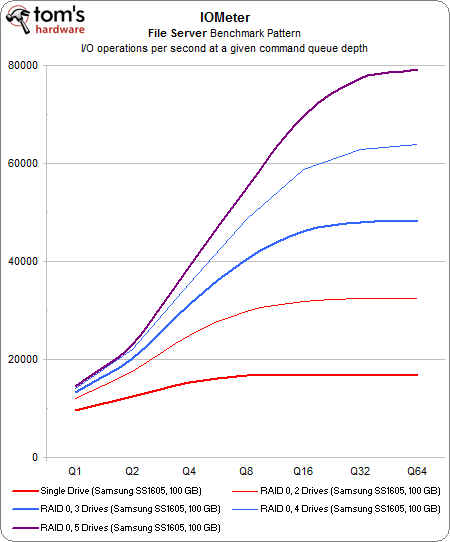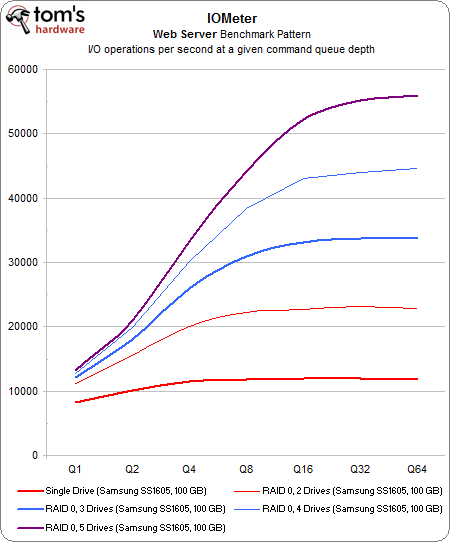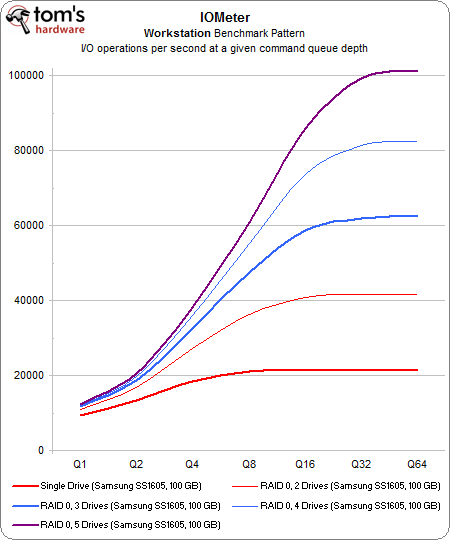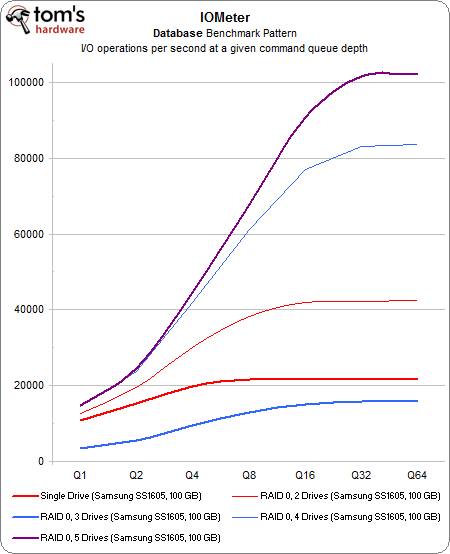SSDs In RAID: A Performance Scaling Analysis
RAID arrays with dozens of hard drives are not uncommon for reaching certain performance levels. We demonstrate how beautifully SSD RAID arrays can scale. There may come a time when a few flash-based drives will replace entire farms of hard disks.
Benchmark Results: I/O Performance
The Iometer benchmark and its File Server, Web Server, and Workstation benchmarks illustrate how the system scales. While a single SSD reaches approximately 15 000 I/O operations per second, a RAID 0 array with two drives gets an additional 10 000 I/O operations. Adding more SSDs increases the total I/O capabilities by roughly the same number.
Each added SSD not only increases capacity, but I/O performance grows strongly and steadily as well. The test system does not seem to be nearing any upper limit of I/O performance, but scales with the same amount for each drive added. Using traditional magnetic hard drives, such performance is only reached by adding a really substantial number drives (in the double-digits). Or, to put it differently, where you once had to add several new servers or huge RAID arrays, buying another SSD might be enough in today's landscape.
The Database benchmark falls somewhat out of place, as a single SSD should achieve better performance. The trend still remains the same, though, with a five-drive RAID 0 array providing much higher I/O throughput.
Get Tom's Hardware's best news and in-depth reviews, straight to your inbox.
Current page: Benchmark Results: I/O Performance
Prev Page Test Setup Next Page Benchmark Results: Iometer Streaming-
mrbongal007 hi, pls help in understanding how are you getting 1000 MB/s performance on a sata3 port/lane which gives max of 600MB/s. if the answer is raid striping across 5 lanes then potentially we can get this performance on a sata2 port as well since each lane is being taxed to appx 200MB/s. appreciate your help in understanding this. thanks.Reply -
oxxfatelostxxo OutPut is through a pci x8 slot. Max transfer of 6gb/s I think. The sata 2 max is per channel for each drive. Not a combined maxReply -
chefboyeb I guess i would be better off adding 2 more ocz vertex ssds to my existing 3 ssd raid 0 setup afterall... I was concerned about the limitations of motherboard, but not anymore... ThanksReply -
maybe is just me only.Reply
3 reason hold me back moving HD to SSD.
1st. money VS pre GB.
2nd. the technology is mature enough to keep that real speed in stabilize performance.
3rd. RAID support in SSD still in wonderland.
conclusion. all the read/write speed in the benchmark is full of BS, but if you can maintain the driver is reading purpose only but never erase and delete any old data and rewrite new files into it. and you are a heavily download user. you will lost the speed advance reading/writing in a SSD over a traditional HD. SSD is pretty fast only in a fresh windows install for the first time. it will lose speed performance in time and you have to do another fresh reinstall again and again. -
nebun oxxfatelostxxo... The motherboard will Max out. You need a raid card to see those speedsor just use an PCIE SSD like the revodrive x2 :) no limitReply



